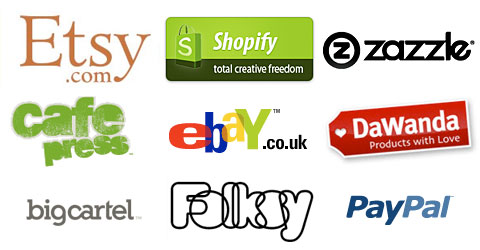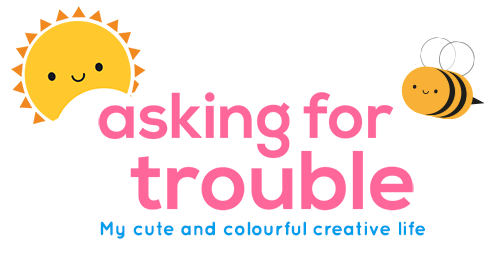
(This was written for the Glasgow Craft Mafia, but I’m sure it will be useful for some of my readers too)
So, you’ve made your products and you want to get them out there for people to buy. What’s the best option for e-commerce? Well, as with most things online, it depends on a lot of different things. There are many different e-commerce options and each have their own pros and cons. Which one suits you best will depend on your range of items, your technical ability, your product prices and your pocket. There’s no ‘best’ solution, just the best solution for you. When it comes down to it, there’s no magic answer – it’s not really where you sell but how well you promote it. So do your research, pick what works for you and do the best you can with it.
I’m going to cover 4 different levels of online shops, and give you the rundown on how they compare and who they’re best suited for.
Glossary:
Listing fee – payment to list an item regardless of whether it sells
Transaction fee – payment after an item sells (usually a percentage of the sale price)
Merchant fees – transaction fees to whoever collects purchase payments (PayPal etc.)
* * * * *
Individual Sales
Sell products individually without the need for a shop
eBay
eBay is probably the best known online marketplace on the internet. Everyone knows about eBay. Although billed as an auction site, Buy It Now listings are becoming more and more popular.
Best For: one of a kind, high priced items
Pros: you can be selling in minutes, as there’s nothing to style or set up after your initial profile
Cons: Difficult to assert your personality and be remembered for return buyers. Lots of competition. No differentiation between handmade/artisan items and random junk.
Technical Knowhow: low. Some knowledge of html can help you improve the look of your listings but it’s not necessary.
Expansion possibilities: you can open a store for a monthly fee.
Cost: listing fee and transaction fee, based on item price, plus merchant fees.
More info: www.ebay.co.uk
PayPal
You probably have a PayPal account already but did you know you can also use their Merchant Tools to create quick sales buttons and shopping cart solutions for an existing website?
Best for: people with an existing website who want to try out online selling without any commitments
Pros: no listing fees; complete control over your listings and page layout.
Cons: Lack of basic features such as regional shipping, variations etc.
Technical Knowhow: Medium. You need your own blog or website and you need some basic html skills
Expansion possibilities: there are various merchant services available but nothing like a real shop.
Cost: transaction fee of 1.4%-3.4%+20p
More info: www.paypal.com
* * * * *
On-Demand Platforms
You create the artwork and they take care of the production, shipping and customer service.
Zazzle
Well-known on-demand site with a wide audience.
Best for: Anyone.
Pros: readymade audience, shallow learning curve, huge range of products from apparel to postage stamps to shoes, good referral deals, UK & US sites.
Cons: Lots of competition, takes time and skill to make stand-out products, getting your shop to look just right can be tricky, quality of actual products unknown unless you order them.
Technical knowhow: Medium. You can get started with no design skills but you’ll need to sharpen up to do well.
Expansion possibilities: Volume Bonus Program for big sellers.
Cost: Free to setup and list, set your own commission rate on sales.
More info: www.zazzle.com
CafePress
One of the first user-generated ecommerce sites and still very popular.
Best for: Anyone.
Pros: readymade audience, shallow learning curve, huge range of products from apparel to homewares to books, UK & US sites.
Cons: Only one design of each product allowed for free shops, new policy of only 10% commission on products sold in the main site marketplace, quality of actual products unknown unless you order them.
Technical knowhow: Medium, similar to Zazzle
Expansion possibilities: Expand to a Premium Shop for a monthly fee
Cost: Free to setup and list, set your own commission rate on sales.
More info: www.cafepress.co.uk
* * * * *
Marketplaces
Set up shop amongst your peers and take advantage of the readymade audience and community.
Etsy
Etsy is fast becoming a household name as the place to buy handmade – it’s almost expected that if you’re making handmade products, you must be on Etsy.
Best for: crafters who like to get involved in a community
Pros: Etsy gets regular features both online and offline, huge resource of information and help, easy to use, good widgets to use on your blog or website.
Cons: Lots of competition, very US-centric, lots of rules about what you can and can’t sell.
Technical knowhow: Low. No html is allowed so you just need to be able to create a banner image.
Expansion possibilities: None.
Cost: 20c per listing, 3.5% transaction fee, plus PayPal fees
More info: www.etsy.com
DaWanda
The European answer to Etsy isn’t well known outside of continental Europe, but it could be a chance to find a new audience.
Best for: people who want to take things slowly while they figure out their niche, multi-lingual crafters, anyone keen to break into Europe.
Pros: Currently free to set up and free to list, excellent features, nice community aspects, option to list products in German and French.
Cons: Not well known, translations only allowed if you are at least semi-fluent in the language or can hire a translator.
Technical knowhow: Low
Expansion possibilities: None
Cost: 5% transaction fee. Listing fees set to arrive sometime soon.
More info: en.dawanda.com
Folksy
New kid on the block Folksy is a friendly community-minded UK marketplace that’s picking up some loyal fans.
Best for: UK sellers sick of listing in dollars and euros and who want to help build something good.
Pros: Smaller group of sellers so easier for people to find your wares. Friendly staff and developers on hand who listen to the community and take their advice.
Cons: Not well known. Only basic features and you will feel a bit like a guinea pig during beta testing.
Technical knowhow: Low
Expansion possibilities: None
Cost: 20p per listing. 5% transaction fee once beta period ends.
More info: www.folksy.com
* * * * *
Hosted shops
BigCartel
Intended for bands and artists, BigCartel is a clean and easy hosted web shop.
Best for: New crafters with a small range
Pros: easy to set up and use, free to start up, no transaction fees.
Cons: Lots of limitations depending on your payment plan.
Technical knowhow: Low.
Expansion possibilities: 3 plans available, ceiling of 100 products.
Cost: PayPal fees only for up to 5 products, then a monthly fee applies. No transaction fee.
More info: bigcartel.com
Shopify
Shopify is a templated web shop which is hosted on their servers. They also have a built-in marketplace where buyers can search through all Shopify shops.
Best for: Established crafters and multi-artist shops with a stock of items and a brand
Pros: style it to match your website exactly and arrange your products and pages how you like. Easy to use admin panel. Lots of neat features including multiple traits and access to abandoned orders. Lots of free themes available with a wide range of of styles and features.
Cons: Needs a lot of technical knowledge (or outside help) to make a template really your own. Initial costs can add up until you make regular sales. No control over shop downtime for upgrades/maintenance by Shopify.
Technical knowhow: Medium to High. You can get started with a minimum of knowledge but you’ll need some programming experience to make something truly original.
Expansion possibilities: Pretty much limitless. Shopify really can grow with you, as your business does.
Cost: Depends on your plan. Basic is $24 pm plus 2% transaction fee, plus merchant fees.
More info: www.shopify.info
* * * * *
Custom install shops (CubeCart, ZenCart)
If you’re planning on installing an e-commerce shop on your own webspace then you’re going to have to do the research yourself. To install, set up and style one of these packages needs technical knowledge, design and programming skills and a clear plan of your requirements.
Best for: Established businesses, control freaks
Pros: complete control of everything, from the look and feel to the payment method. No third party fees unless you choose to use them.
Cons: Lots of work to set up. Your responsibility if anything goes wrong or your site goes down. Control panel is quite technical/unfriendly.
Technical knowhow: High. Will look terrible if you don’t know what you’re doing.
Expansion possibilities: Pretty much limitless. Your next stage after this would be a custom built ecommerce solution.
Cost: Some are free and some cost money. You’ll also need your own web hosting.
More info: Start with www.cubecart.com and www.zen-cart.com and then do some Googling.
Full disclosure: I am a happy customer of Shopify, Folksy, Etsy, DaWanda and Zazzle. Yes, I get around.

